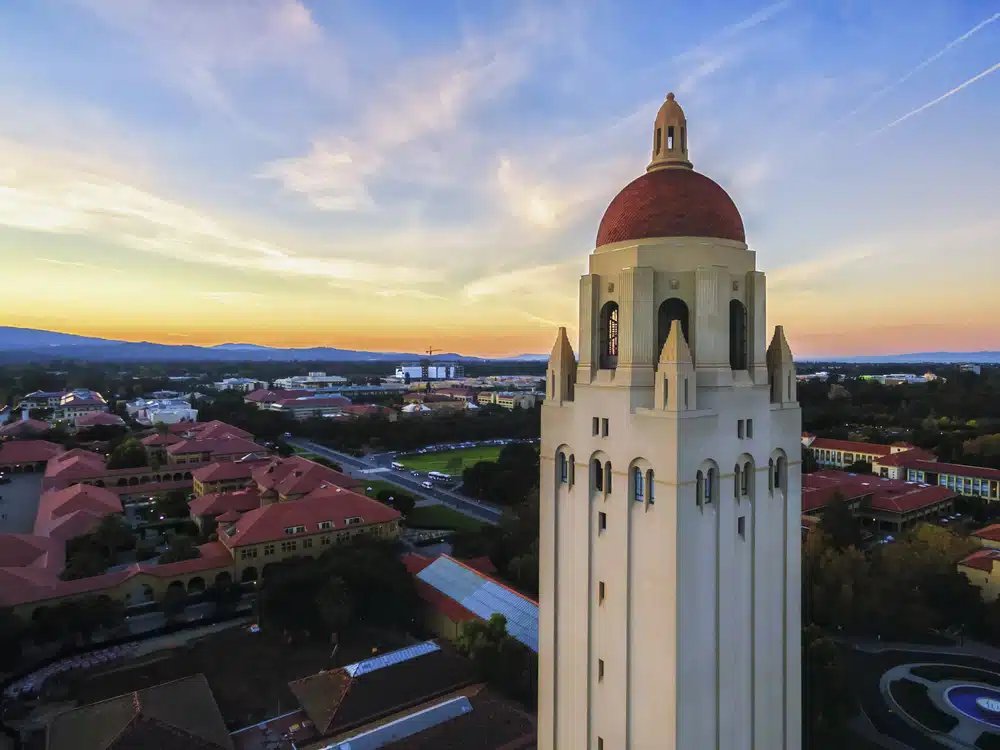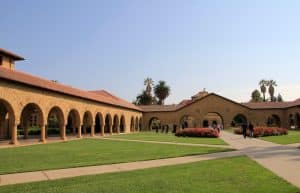Stanford’s Curriculum: A Beacon of Excellence and Innovation
Stanford University, nestled in the heart of Silicon Valley, has garnered worldwide acclaim for its groundbreaking research, notable alumni, and rigorous and innovative curriculum. As a premier institution of higher learning, Stanford’s curriculum stands as a testimony to its commitment to academic excellence, interdisciplinary collaboration, and the cultivation of global leaders.
Understanding the Stanford Education Philosophy
To truly appreciate Stanford’s enticing curriculum, one needs to grasp its unique education philosophy. The Cardinal Compass and The Stanford Way of Learning are at the heart of this philosophy.
The Cardinal Compass
The Cardinal Compass is not just a program but a guiding light intended to illuminate the path for students throughout their journey at Stanford. Rather than dictating a strict and rigid path, the Cardinal Compass provides a multitude of resources, advice, and options for exploration. This program encourages students to engage in self-directed, reflective learning, empowering them to take charge of their education.
From the time of admission through graduation, the Cardinal Compass underscores the necessity of intellectual curiosity, personal growth, academic flexibility, and a self-designed education. It serves as a compass, pointing students in the right direction while allowing them the freedom to chart their own course. By fostering a supportive and inclusive community, it empowers students to follow their passions, explore novel ideas, and make the most of their Stanford education.
Imagine a student embarking on their Stanford journey, armed with the Cardinal Compass as their guide. They are not confined to a predetermined path but are encouraged to forge their own unique educational experience. They have the freedom to delve into subjects that ignite their curiosity, to combine disciplines in innovative ways, and to pursue their own intellectual passions. The Cardinal Compass acts as a constant reminder that education is not just about acquiring knowledge, but about personal growth, discovery, and self-realization.
The Stanford Way of Learning
Integral to Stanford’s educational philosophy is the Stanford Way of Learning. This distinctive approach emphasizes hands-on experiences, cross-disciplinary study, and utilizing a global perspective to solve real-world problems.
Stanford believes that education should not be a passive experience where students simply absorb information from textbooks and lectures. Instead, they are encouraged to actively engage with the material, to question, to experiment, and to apply their knowledge in practical ways. The Stanford Way of Learning transforms students from mere spectators to active participants in their own education.
At Stanford, the learning experience is not confined to the boundaries of a single discipline. The university’s diverse range of courses and programs inspire skilful exploration and integrated learning. Students are encouraged to venture beyond the confines of their major, to explore different fields of study, and to make connections between seemingly unrelated subjects. This cross-disciplinary approach fosters creativity, critical thinking, and a broader understanding of the interconnectedness of knowledge.
Moreover, the Stanford Way of Learning recognizes the importance of a global perspective in today’s interconnected world. Students are encouraged to think beyond the borders of their own community and to consider the impact of their education on a global scale. By incorporating diverse perspectives and experiences, Stanford equips students with the tools to tackle real-world problems and make a meaningful difference in society.
Imagine a Stanford student fully immersed in the Stanford Way of Learning. They are not confined to a single discipline or limited by traditional boundaries. They have the freedom to explore, to connect, and to think critically. They are encouraged to step outside their comfort zone, to embrace new challenges, and to approach problems from multiple angles. The Stanford Way of Learning celebrates educational risk-taking just as much as achievement, recognizing that true growth often comes from stepping into the unknown.
In conclusion, Stanford’s education philosophy goes beyond the traditional notions of learning. It empowers students to take control of their education, to explore their passions, and to make meaningful contributions to society. The Cardinal Compass and The Stanford Way of Learning serve as guiding principles, illuminating the path for students as they embark on their educational journey at Stanford.
Overview of Stanford’s Schools and Departments
With its sprawling campus, Stanford University houses many schools and departments, each with a unique concentration and an immense array of programs.
Stanford University is known for its diverse and prestigious schools and departments, offering students a wide range of academic opportunities. From the humanities to engineering and environmental sciences, Stanford provides a comprehensive education that prepares students for success in their chosen fields.
The School of Humanities and Sciences
The School of Humanities and Sciences is at the core of Stanford’s undergraduate education. It offers a spectrum of courses in the humanities, natural sciences, and social sciences. Whether it’s honing analytical capabilities in Mathematics or exploring the human condition in Literature, this school offers rich fields for exploration and discovery.
Students in the School of Humanities and Sciences have the opportunity to engage with renowned faculty members who are experts in their respective fields. They can participate in groundbreaking research projects and collaborate with peers who share their passion for intellectual exploration.
In addition, the School of Humanities and Sciences also offers several graduate programs with a strong commitment towards making impactful original contributions to knowledge. Graduate students have the opportunity to work closely with faculty mentors and contribute to cutting-edge research in their chosen disciplines.
The School of Engineering
Renowned globally, the School of Engineering at Stanford is a hub for pioneering research and innovation. Dedicated to solving the world’s most pressing problems, it offers programs encompassing numerous branches of engineering.
Students in the School of Engineering benefit from a curriculum that goes beyond traditional classroom learning. They have access to state-of-the-art facilities and resources that allow them to engage in hands-on projects and experiential learning. From designing and building robots to developing sustainable energy solutions, students have the opportunity to apply their knowledge to real-world challenges.
Furthermore, the School of Engineering is known for its strong ties to industry. Students often collaborate with leading companies and startups, gaining valuable industry experience and networking opportunities. This connection to the professional world provides graduates with a competitive edge in the job market.
The School of Earth, Energy and Environmental Sciences
The School of Earth, Energy and Environmental Sciences explores complex natural systems, energy resources, and their potential impacts on the environment. It offers a wealth of programs at both undergraduate and graduate levels, allowing students to delve deep into our planet and beyond.
Students in this school have the opportunity to study a wide range of topics, including geology, climate change, renewable energy, and environmental policy. They learn from world-class faculty members who are actively engaged in research and have a deep understanding of the Earth’s systems.
Combining traditional disciplinary strengths with modern interdisciplinary studies, this school prepares students to address environmental and geoscientific challenges that align with the global needs of sustainability and stewardship. Graduates of the School of Earth, Energy and Environmental Sciences are equipped with the knowledge and skills to make a positive impact on the world.
Navigating the Undergraduate Curriculum
Stanford’s undergraduate curriculum is a blend of mandatory general education requirements and a wide variety of major and minor programs, supplemented by an optional honors track.
At Stanford, the undergraduate curriculum is designed to provide students with a well-rounded education that combines breadth and depth of knowledge. Students have the opportunity to explore a range of subjects through the general education requirements, delve deep into their chosen major or minor programs, and even pursue interdisciplinary honors programs.
General Education Requirements
Stanford’s general education requirements, also known as “Ways of Thinking/Ways of Doing,” are an integral part of the undergraduate experience. These requirements are designed to expose students to a diversity of knowledge areas, promoting deep inquiry and interdisciplinary understanding.
Spanning eight different areas, such as artistic interpretation, social inquiry, or quantitative reasoning, the general education requirements challenge students to think critically about themselves in relation to the world around them. By exploring a wide range of subjects, students develop a broad, liberal education that enhances their capacity for lifetime learning.
Major and Minor Programs
While the general education requirements provide breadth, major and minor programs at Stanford offer depth. With over 65 major fields of undergraduate study and an array of minor programs to choose from, students have the opportunity to pursue their passions and develop a comprehensive understanding of a specific academic field.
From Business to Bioengineering, from Philosophy to Physics, each major or minor program at Stanford is designed to provide students with a deep understanding of the subject matter, including its methods, its body of knowledge, and its distinct modes of thought. These programs culminate in a senior project, allowing students to integrate and deploy what they have learned throughout their academic journey.
Honors Programs
In addition to the standard degree programs, Stanford offers a variety of interdisciplinary honors programs for students who seek an even more challenging and immersive academic experience. These honors programs provide an intimate, rigorous intellectual environment where students and faculty can explore questions of common interest in depth.
Honors students at Stanford have the unique opportunity to work closely with faculty on a year-long independent research or creative project. This experience stimulates an immersive learning experience that pushes beyond the typical boundaries of undergraduate study, allowing students to delve deep into their chosen field and make original contributions to their respective disciplines.
Overall, Stanford’s undergraduate curriculum offers a wealth of opportunities for students to explore and engage with a wide range of subjects. Whether through the general education requirements, major and minor programs, or interdisciplinary honors programs, students are encouraged to pursue their intellectual passions and develop a well-rounded education that prepares them for a lifetime of learning and success.
Delving into the Graduate Curriculum
Stanford’s graduate school offers a broad variety of degree programs – from master’s to doctorate and professional degree programs.
When it comes to pursuing a graduate degree, Stanford University provides an exceptional range of opportunities. With a diverse selection of programs, students can explore their passions and delve into their chosen fields with utmost dedication and enthusiasm.
Master’s Degree Programs
Master’s degree programs at Stanford allow students to develop specialized skills and gain an in-depth understanding of their chosen field. The curriculum is carefully designed to provide a comprehensive education that combines theoretical knowledge with practical application.
Students in the master’s programs engage in rigorous coursework, which is complemented by research, capstone projects, or examinations to fulfill their degree requirements. This multifaceted approach ensures that students not only acquire a strong academic foundation but also develop the necessary skills to excel in their future careers.
Moreover, Stanford’s master’s programs are structured around innovative pedagogy, expert faculty, and state-of-the-art resources. Students have access to cutting-edge facilities and laboratories, allowing them to explore their fields of study in a dynamic and immersive environment.
By embracing a collaborative and interdisciplinary approach, Stanford’s master’s degree programs prepare students for professional success and leadership roles in their respective fields. Graduates emerge as well-rounded individuals equipped with the knowledge, skills, and confidence to make a meaningful impact in their chosen industries.
Doctoral Degree Programs
Doctoral degrees at Stanford are research-oriented and serve to cultivate scholars who are passionate about pushing the boundaries of knowledge in their fields. These highly selective programs are designed for individuals who are driven by intellectual curiosity and a desire to make significant contributions to their disciplines.
Doctoral candidates at Stanford embark on an intensive learning journey, which involves rigorous coursework and original research leading to a dissertation. The dissertation must not only demonstrate a deep understanding of the subject but also contribute significantly to existing knowledge in the discipline.
Throughout their doctoral studies, Stanford’s faculty mentors play a crucial role in guiding and supporting candidates. These mentors are renowned experts in their respective fields, providing invaluable guidance and fostering academic excellence, resilience, and independent thinking.
By immersing themselves in a vibrant scholarly community, doctoral students at Stanford have the opportunity to collaborate with fellow researchers, attend conferences, and engage in intellectual discussions that further enrich their academic experience. This collaborative environment nurtures a spirit of innovation and fosters the development of groundbreaking research.
Professional Degree Programs
Professional degree programs at Stanford are designed to develop the knowledge and skills required for professional careers in areas such as law, medicine, business, or education. These programs cater to individuals who are seeking specialized expertise and practical training to excel in their chosen professions.
Stanford’s professional degrees combine theoretical knowledge with practical application, ensuring that students are not only familiar with the latest concepts in their field but also equipped to apply them in real-world scenarios. The curriculum is carefully crafted to provide a balance between academic rigor and hands-on experience.
Students in professional degree programs benefit from the expertise of faculty members who are not only accomplished scholars but also experienced professionals in their respective fields. This unique blend of academic and practical knowledge enables students to gain insights from real-world experiences and develop a deep understanding of the challenges and opportunities in their chosen professions.
Furthermore, Stanford’s professional degree programs offer numerous opportunities for internships, externships, and experiential learning, allowing students to apply their skills in real-world settings. These practical experiences not only enhance their learning but also provide valuable networking opportunities and potential career pathways.
Whether you’re a prospective first-year student, a postgraduate candidate, or a mid-career professional seeking development opportunities, Stanford’s expansive curriculum caters to your academic and professional ambitions. The focused and hands-on approach, a tight-knit community of scholars, and a vibrant campus life make Stanford a hub of lifelong learning.
At Stanford, the pursuit of knowledge is not limited to the classroom. The university fosters an environment that encourages intellectual curiosity, critical thinking, and collaboration. Students have access to various academic resources, including libraries, research centers, and laboratories, which further enhance their learning experience.
Moreover, Stanford’s campus is a thriving hub of cultural and intellectual activities. From guest lectures by renowned scholars to art exhibitions and performances, something is always happening on campus to stimulate the mind and inspire creativity.
Stanford’s commitment to diversity and inclusion is also reflected in its graduate programs. The university values the unique perspectives and experiences that students from different backgrounds bring to the table. This diversity enriches the learning environment and encourages the exchange of ideas and perspectives.
Stanford’s graduate curriculum fosters intellectual growth, personal development, and professional success. With a wide array of degree programs, exceptional faculty, and a supportive community, Stanford University provides an unparalleled educational experience for graduate students.
Conclusion
Stanford’s curriculum is more than just a collection of courses; it’s a dynamic framework crafted to nurture thinkers, innovators, leaders, and visionaries. It is rooted in a rich history but is ever-evolving to meet future challenges. With its unique blend of interdisciplinary learning, real-world application, and research-driven approach, Stanford University remains a beacon of academic excellence, producing graduates poised to make significant contributions to the world.
If you need help putting the finishing touches on your college applications, at AdmissionSight, we have over 10 years of experience guiding students through the competitive admissions process.
AdmissionSight can help you put your best foot forward when applying to college this fall. Contact us today for more information on our services.










































